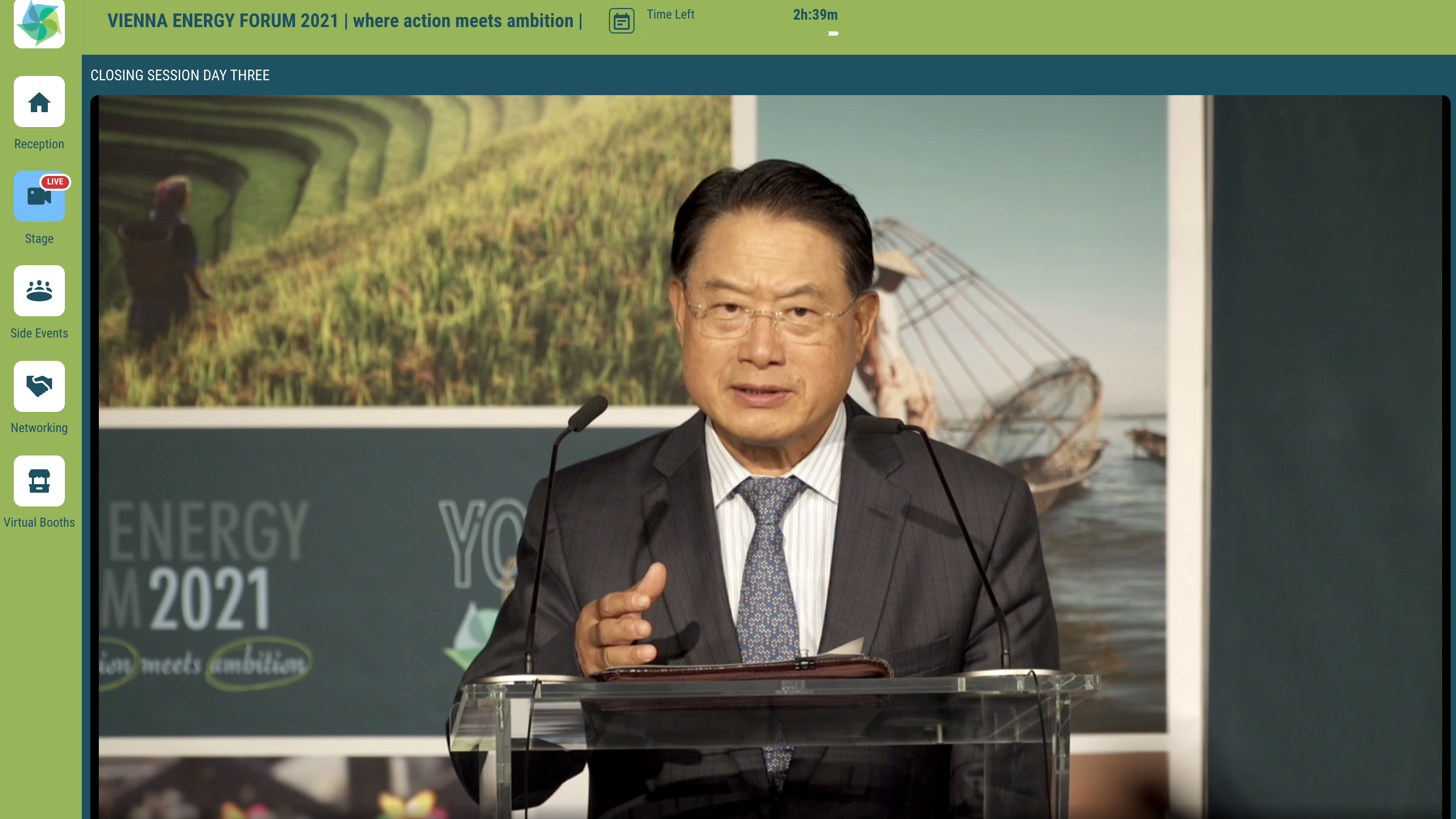2021 Vienna Energy Forum: where action meets ambition
13 July 2021

VIENNA, 13 July 2021— The Vienna Energy Forum (VEF) 2021, guided by the motto “Where action meets ambition,” convened to deliver action-oriented strategies that drive a green transformation, advance climate commitments and achieve the ambition of tackling climate change in an inclusive manner, leaving no one behind. Held virtually from 5 to 7 July, the VEF 2021 gathered over 300 key panellists, including government representatives, stakeholders and experts; and over 2,000 participants from 146 countries, including government ministers, senior officials from UN agencies and other international and regional organizations, and representatives from the private sector, civil society and academia.
The Vienna Energy Forum launched its 2021 edition with the first-ever “Youth for VEF,” hosted in partnership with the SDG7 Youth Constituency of the United Nations Major Group for Children and Youth. Referring to the United Nations Industrial Development Organization’s (UNIDO) commitment to the inclusion of youth to drive sustainable energy and the industrial transformation, Fatou Haidara, UNIDO Managing Director, stated, “We must ensure that the decisions taken today on energy policies and energy infrastructure take into account the needs of our future generations. These policies must provide adequate possibilities for youth and ensure that no one is left behind.”
As a flagship platform organized “by youth, for youth,” the Youth for VEF provided a space for youth and entry-level professionals to advance their skills through open dialogues, learning experiences and networking opportunities. The Plenary Segment hosted one Youth-Policymaker Debate and two sessions exploring future-proof skills and enabling environments. Overall, the Youth for VEF was characterized by interactive sessions, from skills academy workshops, focusing on energy efficiency policies and women-centred financing, to virtual coffee meetings with energy experts and virtual tours to energy facilities.
LI Yong, Director General of UNIDO, heralded the message of the Vienna Energy Forum 2021 as the place where action meets ambition, saying, “We need to work together to ensure that energy innovation, governance and cooperation are aligned with our 2030 and 2050 targets and that we create transparent and competitive markets with the same level playing field for all.”
The VEF 2021 brought together senior government representatives and leading experts in four high-level thematic plenary sessions, four executive dialogues, 28 side events and 13 exhibition booths, partnering with a myriad of organizations.
The four high-level thematic plenaries during Day 1 focused on discussing key priorities and highlighting opportunities and potential solutions on global climate action. The discussions addressed the pathways that stimulate demand whilst promoting an inclusive economic recovery:
- “Accelerating Action”: designed to build momentum to support the outcomes of major approaching energy events: the High-Level Dialogue on Energy, the G20 Leaders’ Summit and the UN Framework Convention on Climate Change’s (UNFCCC) 26th Conference of Parties (COP 26). In this respect, Ovais Sarmad, Deputy Executive Secretary of the UNFCCC, indicated that to ensure progress at COP 26, it is important to align all public and private finance flows with the Paris Agreement climate goals, encourage inclusive multilateralism, bridge the gap between negotiations and implementation, and ensure no one gets left behind.
- “Food System Transformation”: exploring the way forward to integrate renewable energy solutions into food systems and highlighting the potential for multiple wins at all stages of the value chain.
- “Industry Integration”: focusing on the role of energy-intensive industries in achieving a carbon-neutral economy that increases energy security and creates sustainable jobs for everyone; and the role of digitalization in transforming markets, spurring innovation and accelerating the integration of safe, sustainable energy in industrial value chains.
- “Energy Efficient Products”: discussing the enabling factors to spur product innovation and market development, and reduce entry barriers for entrepreneurs and end-users.
The four executive dialogues during Day 2 of the VEF 2021 were centred on a forward-looking perspective on our energy systems, highlighting the need to transform existing models to enable the transition to renewable electricity systems:
- “Re-imagining our Energy Systems”: focusing on the structural shifts in the energy systems that would enable a substantial increase in global renewable energies through the access to capital, finance, and sustainable infrastructure—such as energy grids.
- “Consumers at the forefront”: exploring the policy and regulatory frameworks required to enable consumers to contribute to flexible and green energy systems, and delving into the opportunities for Energy-as-a-Service (EaaS) providers to align their services to end-user dimensions.
- “Future Mobility”: discussing the challenges and opportunities in electrifying vehicle fleets, particularly public transport in developing countries, and exploring the importance of fast-charging infrastructure in imbuing both investor and end-user confidence in electric mobility. In this respect, Maruxa Cardama, Secretary-General, Partnership on Sustainable, Low-Carbon Transport, stressed that road vehicles represent almost three quarters of emissions for the transport sector, noting, therefore, that electric mobility solutions powered by renewable energy will be essential to meet the Paris Agreement targets.
- “The Climate Imperative Spotlight on Small Island Developing States”: exploring the opportunities presented by the roll-out of blue sustainable energy and climate technologies to help SIDS diversify their economies, create new income streams, reduce fuel import dependencies, and support local COVID-19 recovery.
The Vienna Energy Forum 2021 closed with calls for increased action and commitments towards driving development through the deployment of sustainable energy.
Amina J. Mohammed, Deputy Secretary-General of the United Nations, called for close cooperation: “We need to grow the global coalition for net-zero emissions by mid-century. Every country, city, company and financial institution sector must come on board.”
Detailed Summary Reports are available here.
For more information, please contact us.